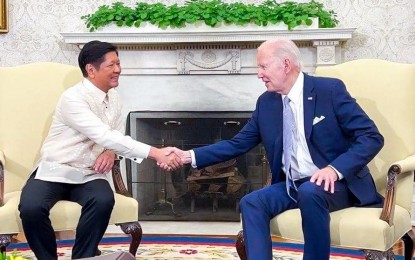
IRONCLAD ALLIANCE. Presidents Ferdinand Marcos Jr. and Joe Biden shake hands during a meeting at the White House on Monday (May 1, 2023). The two committed to strengthen the longstanding alliance in terms of economic and military cooperation. (Photo courtesy of PCO)
MANILA – President Ferdinand R. Marcos Jr. and United States President Joseph Biden on Monday (Washington D.C. time) committed to strengthen the longstanding US-Philippines alliance, particularly in terms of deepening military and economic cooperation.
In a joint statement, Marcos and Biden announced a number of new arrangements and initiatives to expand on the "historic momentum" in US-Philippine relations, which are defined by "remarkable ties of friendship, community, and shared sacrifice".
The two leaders reviewed opportunities to deepen economic cooperation and promote inclusive prosperity, expand our nations’ special people-to-people ties, invest in the clean energy transition and address the climate crisis and ensure respect for human rights.
“In efforts to promote inclusive and broad-based prosperity, invest in the clean energy transition and the fight against climate change, uphold international peace and stability, and ensure respect for human rights and the rule of law, the United States and the Philippines will remain the closest of allies, working together to deliver a better future for our citizens and tackle the emerging challenges of the twenty-first century,” the joint statement read.
Security cooperation, humanitarian aid
Biden reaffirmed the United States’ ironclad alliance commitments to the Philippines.
Both countries also adopted the Bilateral Defense Guidelines that institutionalize key bilateral priorities, mechanisms, and processes to deepen alliance cooperation and interoperability across land, sea, air, space and cyberspace.
Marcos and Biden welcomed the identification of new sites under the US-Philippines Enhanced Defense Cooperation Agreement (EDCA), which will "strengthen Philippine security and support the Armed Forces of the Philippines’ modernization goals".
The prospective EDCA sites are also seen to drive US investment to local communities across the Philippines and improve the countries' shared ability to rapidly deliver humanitarian assistance and disaster relief.
Both leaders underscored their “unwavering commitment” to freedom of navigation and overflight in the South China Sea, as well as the importance of respecting the sovereign rights of states within their exclusive economic zones consistent with international law.
“The leaders support the right and ability of Filipino fisherfolk to pursue their traditional livelihoods. The leaders note the ruling of the 2016 arbitral tribunal, constituted pursuant to the United Nations Convention on the Law of the Sea (UNCLOS),” the statement added.
They also affirmed the importance of maintaining peace and stability across the Taiwan Strait, which they described as an “indispensable element of global security and prosperity.”
Both Biden and Marcos conveyed their support for Ukraine in its sovereignty, independence, and territorial integrity within its internationally recognized borders, “noting that the conflict (with Russia) has adversely affected food and energy security in the Indo-Pacific.”
In a Stratbase ADR Institute forum on Tuesday, US Embassy in Manila Political Counselor Brett Blackshaw said the US also recognizes the Ayungin Shoal as part of the Philippines.
The statement came after China’s latest activities in the area, including a “near-collision” between the BRP Malapascua and a Chinese Coast Guard vessel on April 23.
“On the US policy, our view is that Ayungin, Second Thomas, falls fully on the Philippine sovereignty and jurisdiction and that the PRC (People’s Republic of China) has no lawful territorial or maritime claim there,” he said.
Economic cooperation
Marcos and Biden agreed to promote economic growth and prosperity in the Philippines, in the United States, and the broader Indo-Pacific region.
Biden will dispatch a Presidential Trade and Investment Mission to the Philippines on his behalf, to enhance US companies’ investment in the Philippines’ innovation economy, its clean energy transition and critical minerals sector, and the food security of its people.
The Philippines and the US will also co-host the 6th annual 2024 Indo-Pacific Business Forum in Manila, described as the US’ “marquee commercial event in the region.”
The forum is seen to strengthen the Philippines as a "key hub for regional supply chains and high-quality investment."
To advance a secure 5G rollout in the Philippines, strengthen its innovation economy, and provide digital upskilling opportunities to Philippine workers, the United States also plans to establish a brick-and-mortar Open RAN Interoperability Lab in Manila.
The Lab will provide hands-on training to current and aspiring 5G professionals and provide an opportunity for vendors and operators deploying Open RAN worldwide to teach and educate local engineers in how to design, build, and operate these open, secure, and interoperable networks.
Rule of law, human rights
Marcos and Biden underscored the need to strengthen democratic institutions, rule of law, and respect for human rights, including freedom of expression, press, and association.
The two leaders further noted the importance of countering any form of violence, such as that against civil society, women, children, and marginalized groups.
The leaders welcomed the creation of a bilateral Labor Working Group as part of the US-Philippines Trade and Investment Framework Agreement, which is seen to provide a crucial opportunity for the United States and the Philippines to “work together on implementation of internationally recognized labor rights".
The bilateral labor working group would also facilitate exchange and dialogue among US and Philippine governments and labor unions, as well as employer organizations.
Both leaders resolved to expand cooperation on environmental protections, including enhanced domain awareness, marine conservation, and protecting coastal areas from environmental degradation.
Blackshaw said Marcos’ trip and the previous high-level visits of US officials to Manila are a reflection of a reinvigorated US-Philippines relations.
“There’s a lot of energy back in this relationship, in this alliance,” he said
“On the US side I can assure you the underpinning of our approach is that the United States values the Philippines as an equal sovereign partner,” he added.
He said the US supports Manila in building its deterrence capability not to provoke but to prevent conflict. (PNA)
